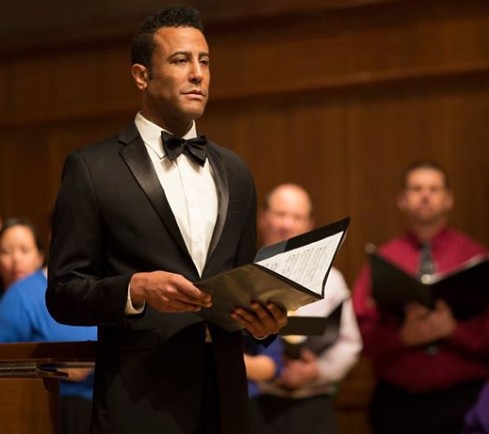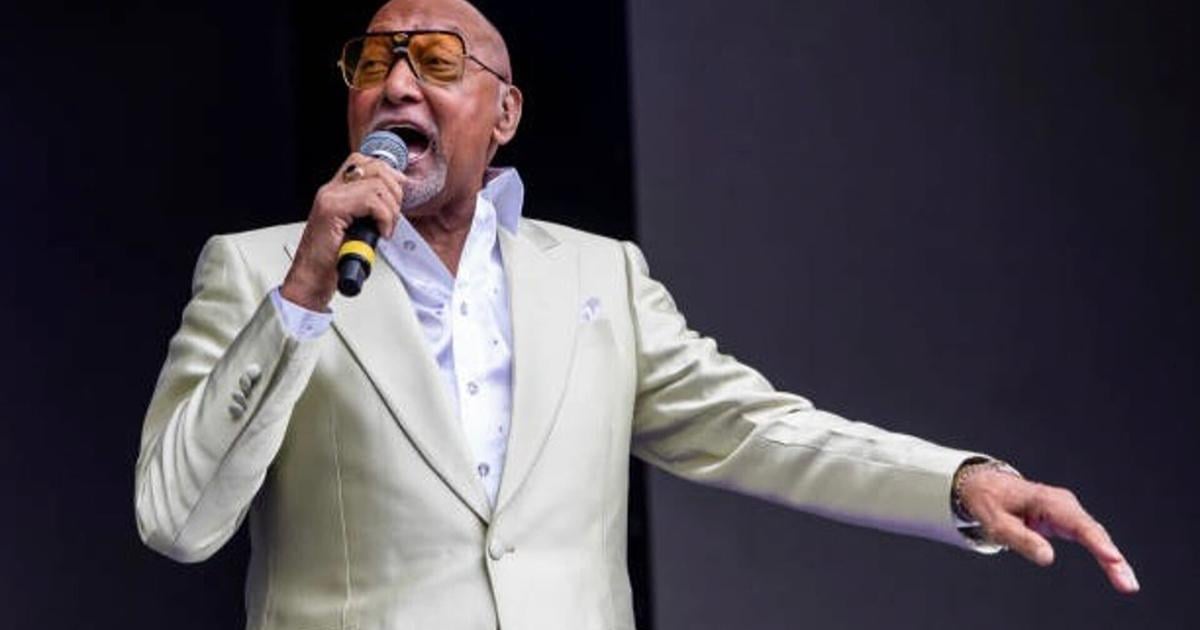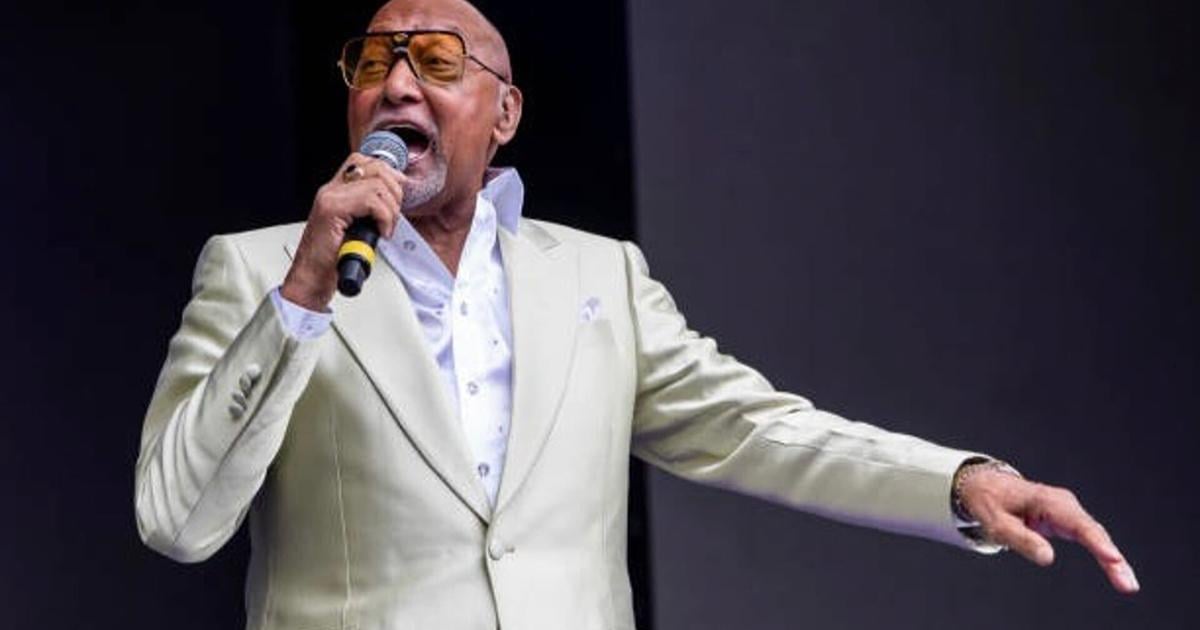For baritone Bradley Kynard, the road to opera houses, concert halls and churches across the world began one day while, as a 30-year-old information technology employee, he hummed a tune in the office.
“It was nothing classical,” Kynard said during a Sunday telephone interview from his San Francisco residence. “It was probably gospel or R&B.”
A “Mrs. Benjamin,” a teacher in a Los Angeles Uniifed school, heard him, and suggested he had vocal talent and should visit a voice teacher, he recalled.
“So I went on a dare,” said Kynard, who will sing the role of Sportin’ Life, a dope peddler of “happy dust,” during the Vallejo Sympony’s concert version of George Gershwin’s “Porgy and Bess” opera on April 20 and 21 at the Empress Theatre in downtown Vallejo.
“I was stupid enough to think I could do it,” he added.
A Los Angeles native, Kynard (pronounced as “Kinnard”) visited one voice teacher, then another, which made a difference. However, he “almost didn’t go” to the second one because the fee was “ridiculously low,” he said.
A retired opera singer who loved teaching, the voice teacher asked him to sing a scale. He did, and the teacher quickly responded, saying, “No, no, no. Hold your mouth like so and breathe here,” Kynard recollected,
According to information at his website, he followed the instruction and produced, he said, a “ridiculously loud sound.”
Kynard recalled being “stupefied” in that moment and his interest piqued, but he had no intention of singing opera. He did, however, enjoy the technical aspects of singing, that he could communicate things without words and continuously improve.
Time and circumstance came and went and his tastes and ear changed. Slowly, he began to enjoy the sensation of singing and opera, he said, then recalled that his voice teacher told him a professional singing career was “going to be a lot of sweat and tears.”
“He was correct,” said Kynard. “Why do something easy? If it’s easy, who wants it?”
When interviewed Easter Sunday, Kynard said he had just returned from a performance of “The Seven Last Words of Christ,” the oratorio by the 18th-century French composer Theodore Dubois.
In April, he will travel to France and later to Scuol, Switzerland, where he will sing a baritone part in Beethoven’s “Choral” Symphony.
On Monday, he will meet with fellow “Porgy and Bess” soloists, soprano Tiffany Austin, who sings the role of Bess, and baritone Robert Sims, who sings the role of Porgy, to discuss the concept of the semi-staged performance.

In this concert version, the classic songs (with libretto by author DuBose Heyward and Gerswhin’s brother, Ira) — among them “Summertime,” “A Woman is a Sometime Thing,” “I Got Plenty o’ Nuttin’,” “Bess, You Is My Woman Now,” “My Man’s Gone Now,” and “It Ain’t Necessarily So” — are arranged by Russell Garcia, as written for legendary singer Ella Fitzgerald and jazz trumpeter Louis Armstrong in 1959. The program also will be presented alongside members of Verismo Opera, with conductor Marc Taddei leading the orchestra.
Of his character for the “Porgy and Bess” performances, Kynard said the cynical Sportin’ Life “understands life” and is pragmatic.
His signature song is the jazz-inflected “It Ain’t Necessarily So,” and symbolizes the split genre of the 1935 opera. While the denizens of Catfish Row, a tenement in Charleston, South Carolina, lyrically express hope to rise above their living conditions, Sportin’ Life doesn’t have hope — “He has dope,” said Kynard.
During the tune, Sportin’ Life, sly and slithery, treats any bystanders within earshot to a sermon of sorts in praise of skepticism, singing in triplets and tritones, one of the opera’s best numbers: “It ain’t necessarily so,/De tings dat you li’ble/To read in de Bible,/It ain’t necessarily so; and/Oh, Jonah, he lived in de whale,/Fo’ he made his home in/Dat fish’s abdomen/Oh, Jonah, he lived in de whale.”
“I like his character,” said Kynard. “Who wants to be boring? Not that I’m for drug sales, but who wants to be boring? Angelic is boring.”
In the opera, toward the end, Porgy stabs Crown, Bess’ boyfriend, and is arrested for the killing and taken away by a detective. Sportin’ Life sings “There’s a Boat Dat’s Leavin’ Soon for New York.” After returning to Catfish Row, he learns that Bess has run off with Sportin’ Life and sings “Bess, O Where’s My Bess?”
“And Porgy goes off, pursuing them, in a goatcart,” said Kynard, who has sung roles in Orff’s “Carmina Burana” and Humperdinck’s “Hansel and Gretel.”
While those operas are part of the standard opera repertoire, many of his perfomances have been in contemporary operas, including Jake Heggie’s “Moby-Dick” in 2010.
While many people find “Porgy and Bess” to be a caricature of Black life as lived nearly 100 years ago, Kynard conceded it is a “non-Black interpretation of what Black people sound like.”
“But it happens to be entertaining and catchy,” he said. “As a Black American you have to put things in context. There’s a hint of (Gershwin’s) flattery in it of copying Black style.”

For several decades past, “Porgy and Bess” was considered a musical, its original incarnation, and it premiered on Broadway. However, more recently it has been performed in opera houses around the world. It boasts a mix of melodic and rhythmic themes and fuses jazz, Broadway and any number of Black and Jewish-American musical forms into a singular creation. It is now considered the first American opera.
Kynard’s mother was a nurse, his father a teacher and musician who played piano and organ, recorded several jazz albums in the 1970s, played in many recording sessions and even toured with Gladys Knight and The Pips for a time. Both died before he was 18.
He confessed that, despite his father’s career, he had no interest in making music his life’s work. At the outset of a nascent entertainment career, he maintained his IT job “until the income was sufficient” and moved to San Francisco, where there was more work than in Los Angeles. He eventually auditioned and was accepted into the Francisco Opera Chorus and performed solo roles on the side.
“I said farewell to the chorus,” he quipped. “I was tired of singing in the back.”
To stay at the top of his game, Kynard still sees a voice teacher, who is in his 80s and who still performs regularly and “accepts nothing but total dedication.” His diction coach is in her 70s. His running partner is 77 and has run 117 marathons.
“There’s a theme here. Over the years I’ve found that the most helpful folk are the elders,” he said. “I have a general rule now: If you’re under 70 years of age you most likely won’t be the most helpful. Why waste time? The older folk have figured it out.”
For those who attend the performances, Kynard said the audience should listen to “good melodies and good music. I don’t care how good the story is, if the music doesn’t caress the ear, it won’t work.”
In a previous prepared statement, Tim Zumwalt, the symphony spokesman, said the symphony’s Gershwin series, of which this will be the third and last of the orchestra’s 91st season, “Will be, without question, one of the most important and unusual musical events in the Bay Area this season.”
A preconcert talk, “Meet the Music,” will be presented one hour before the performance and feature conversations between Taddei and guest artists, offering insights into the program, Zumwalt added.
The Vallejo Symphony can be heard on the radio, KZCT-FM 89.5, and the “Porgy and Bess” concert will be aired at 10:30 a.m. May 3.
In addition, guest artists will appear in live interviews and those program times will be posted on Facebook/VallejoSymphony.
IF YOU GO
- What: Vallejo Symphony’s concert version of “Porgy and Bess”
- When: 8 p.m. April 20 and 3 p.m. April 21.
- Where: Empress Theatre, 330 Virginia St.
- Tickets: $50 to $80, available online. Group tickets are available, with discounts for 10 or more.
- Online: www.vallejosymphony.org
- Phone: (707) 643-4441





